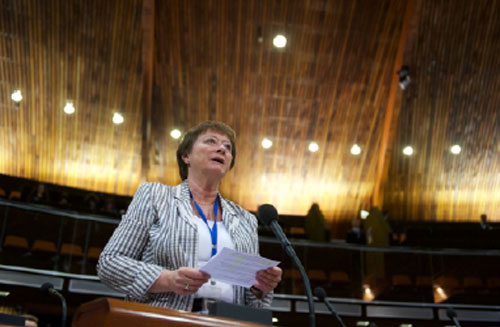Spring session of the Council of Europe’s Parliamentary Assembly
Migration and the EU-Turkey agreement were at the top of the agenda during the spring session of the Council of Europe’s Parliamentary Assembly (PACE).

Lise Christoffersen. Photo: Storting
EU-Turkey deal
For many months now the refugee crisis in Europe has brought to the fore numerous questions about fundamental human rights and respect for the rights of refugees. This was also a primary concern when PACE’s general assembly passed a resolution on Wednesday 20th April that questioned important human rights aspects of the deal agreed between the EU and Turkey and ratified by the EU Commission on 18th March this year.
In the adopted resolution, PACE questions the practice of interning refugees and asks whether Greece has the capacity to treat all asylum applications as genuinely and thoroughly as required by international norms and standards. In addition, the resolution calls into question the extent to which Turkey is in a position to give returned refugees the protection they are entitled to under EU legislation and international law. The resolution also underlines the EU’s duty to give sufficient support to Greece and Turkey at all levels to help them cope with the huge numbers of refugees arriving on their shores.
The resolution was passed the day after both Jean Claude Juncker, the President of the European Commission, and Ahmet Davutoglu, the Prime Minister of Turkey, had spoken to the assembly. Mr Juncker stressed that the deal between the EU and Turkey respected European and international norms. He underlined how essential it was that every asylum application was treated on an individual basis, that all applicants had the right to appeal against decisions, and that the principle of “non-refoulement” (which forbids sending a true victim of persecution back to his or her persecutor) was inviolable. Mr Davutoglu underlined the hope that the EU-Turkey deal would reduce the numbers embarking on dangerous voyages across the Mediterranean, which in itself would save many lives. He was of the view that the agreement had already resulted in a dramatic reduction in the number of crossings.
“PACE has quite correctly drawn attention to aspects of the deal that there is reason to be especially aware of,” Ingjerd Schou, Head of the Norwegian Delegation, said. “Nevertheless, the most important thing now is that Europe reaches mutually binding solutions, whether these be for the distribution of refugees within Europe, better border controls, or the necessary support to Greece and Syria’s immediate neighbours,” she continued. “Last but not least, it’s essential that we increase our efforts to combat the underlying causes for the huge numbers of refugees on the move,” Ms Schou concluded.
Fighting terror
Another issue that PACE devoted considerable time to was the fight against terror; a fight that cannot simply be won by means of enhanced security measures and improved surveillance. This point was clearly made during the debate on how to prevent the radicalization of children and how to reinforce the notion of democratic citizenship through teaching in schools. Here the assembly welcomed the Council of Europe’s development of a new framework of skills for teaching democracy and intercultural dialogue in schools. However, in a debate on steps to be taken in the aftermath of the Brussels attacks on 22nd March, the assembly also stated that it was vital to learn from the errors that were made there. Support was given to the setting-up of a pan-European intelligence and counter-terrorism body. The assembly underlined the need for a better European security strategy, including more information sharing between the intelligence services, the police and the judicial authorities.
The assembly also arranged an urgent debate on the ‘Panama Papers’, and how such matters as these affect public confidence in the elected representatives of the people and the democratic systems they serve. Among the other items on the agenda during PACE’s April session were antisemitism, female representation in politics, and the humanitarian concerns with regard to people captured during the war in Ukraine.
Lise Christoffersen took part in the debate on antisemitism. During her speech she stressed that growing intolerance is an increasing problem among many groups in society.
“With this in mind, the young Norwegian Muslims who formed a human ring around the Oslo synagogue in February 2015 should be a model to us all,” she said.
Last updated: 26.04.2016 08:55